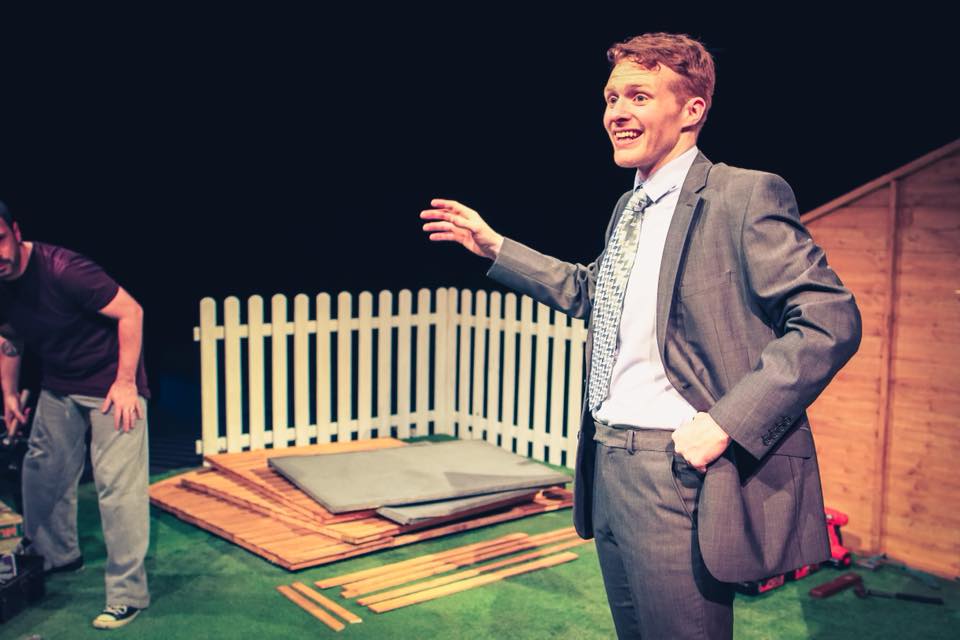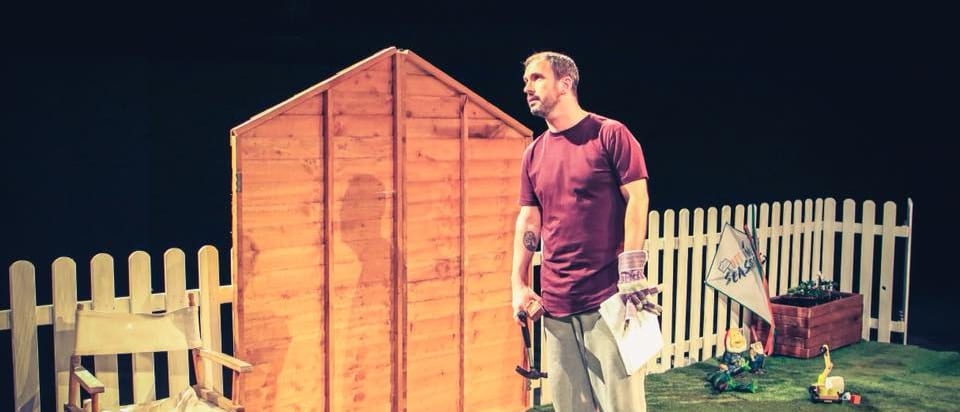All Brian really wants is an afternoon to himself, so he can build a shed to put ‘his stuff’ in. Is it too much to ask? In Shed Man, Kevin Jones offers an ambiguous portrayal of a man on the verge of a nervous breakdown. Part-dark social comedy, part-psychological drama, Shed Man is a short play with indubitable potential. However, while the script scores numerous points along the way, the final product suffers from a lack of psychological consistency which makes for a puzzling viewing experience.
On a sunny day, Brian (Benedict Hurley) sets out to build his own wooden shed in the garden. His wife (warmly portrayed by Chrissie Neale) briefly tries to convince him to accompany her and their children on a trip to the beach but has to relent to Brian’s stubbornness. However, his solo afternoon is quickly interrupted by the arrival of his boss, Mr. Tatum (Joe Burke), and his mother, Pat (Siw Hughes), both seemingly intent on ruining Brian’s plans.
Let’s face it: when the play begins, it is hard to feel any sympathy at all for Brian, this man-child in his slacks and old tee-shirt. He is so bent on building his man-cave that his first suggestion, when his wife asks for his help on a trip to the beach, is to suggest that she asks his ‘Mam’ to look after the kids for him instead. In this day and age, infantile masculinity has undeniably lost its appeal. This is only true, however, until Mr Tatum and Pat show up and start invading Brian’s bubble of peace. I am using ‘invading’ purposefully here. The play draws our attention to Brian’s apparent inability to carve out a personal space. Tatum’s intrusiveness goes so far as to check Brian’s phone for him. His mother starts telling his employer of Brian’s adolescent habit to hide away from the world. Pat and Tatum’s dynamic in the first twenty minutes of the play is hilariously wry, as the two become unlikely allies conspiring to ruin Brian’s perfect solo afternoon. The dialogue astutely pins down Tatum’s good-mannered pushiness and Pat’s delight in finding a listening ear for her ailments. The potential for some dark comedy that might end with Brian’s hammer in Tatum’s skull is great here – but sadly not followed through.

Instead, we are made to witness the gradual transformation of Tatum’s character, as he evolves from amusingly overbearing to strangely aggressive to inexplicably psychotic. It is equally difficult to understand what to make of Brian’s mother’s reactions to his boss’s abuse of her son: why, for example, does she not react more strongly to his blatant belittling of her child? Why does she applaud her son’s humiliation? Halfway through, the play suffers from an identity crisis which never gets solved, not even through the revelation of a – somewhat overused – framing device, which must be kept secret here to avoid spoiling the whole story. Suffice it to say that while the play’s ending does explain some of its apparent oddity, this is no excuse for what eventually comes across as lop-sided characterisation and plot.
The setting, a grass patch framed by a white barrier, with Brian’s shed at the centre, hints at the protagonist’s sense of confinement in the boundaries of his life. Tatum, Pat, and Emma all circulate freely from one side (Brian’s house) to the other (the exit leading to the city) of the stage – only Brian remains, intent on completing his pet project but apparently unable to prevent it from being trampled over by others. In times of tension the peaceful garden takes on nightmarish looks, thanks to Josh Bowles’ tense audio effects and Louise Swindell’s oscillating lights. The soundscape – a mix of early 2000s indie bands – also had a strange familiarity effect: it is funny to think of Brian as someone who would have been in his twenties when those songs were released, and to see the result, as Brian seems to remain an overgrown teenager. However, not even the great cast and production can really prevent the impression that the play is going in different directions at the same time.

